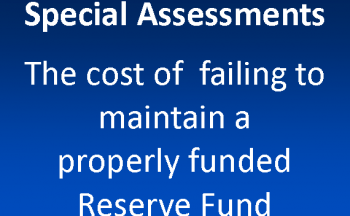 December 2019
December 2019
There are two real numbers in a reserve fund study; current year contribution and opening balance.
With the exception of these two numbers, everything in a reserve fund study is an estimate. As with all estimates, results are dependent on a series of assumptions.
Developing a reserve fund study and determining reserve fund contributions necessarily entails assumptions on what will occur in the future. The more practical these assumptions, the more reliable the reserve fund study.
When making reserve fund assumptions, Brown and Beattie, which prepares Reserve Fund Studies, identifies several items that can have the greatest impact on a reserve fund study:
- Should inflation be less than what is used in a reserve fund study, the reserve fund can have more or less money than anticipated depending on how revenue and expenses are impacted.
- When actual return on invested funds is less than anticipated, a reserve fund will have less money than expected.
- When anticipated expenses in a reserve fund are higher than anticipated or occur sooner than the study anticipated, the reserve fund will require a cash infusion at some point.
- Should items be omitted from a reserve fund study, the reserve fund may be inadequate to pay necessary expenditures thus requiring a cash infusion.
Improved practicality in the reserve fund study is your best protection against unforeseen charges and unexpected changes to a reserve fund balance, both of which may necessitate an increase in condo fees or special assessment.







